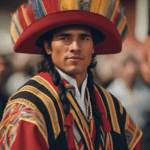
Ecuador, officially known as the Republic of Ecuador, is a country located in South America. It shares its borders with Colombia to the north, Peru to the east and south, and the Pacific Ocean to the west. The country also includes the Galapagos Islands in the Pacific, about 1,000 kilometers west of the mainland. The capital city is Quito, while the largest city is Guayaquil.
Ecuador is one of the most biodiverse countries in the world. It is divided into four main geographic regions: the coastal lowlands, the mountainous highlands, the eastern jungle lowlands, and the Galapagos Islands. The country is home to a range of ecosystems, from the tropical rainforests of the Amazon to the mountainous regions of the Andes, and the unique wildlife of the Galapagos Islands.
Ecuador has a rich history that dates back to the ancient Inca Empire. The Spanish conquered the region in the 16th century and ruled until 1822 when Ecuador gained independence after the Battle of Pichincha. The country has experienced periods of political instability, with several changes in government throughout the 20th and 21st centuries.
Ecuador has a diverse population of approximately 17 million people. The culture of Ecuador is a mix of indigenous traditions and Spanish colonial influence, with significant African elements in the coastal region. The official language is Spanish, but Quichua, an Inca language, is spoken by the indigenous population. The country is known for its vibrant festivals, colorful handicrafts, and distinctive music and dance.
Ecuador’s economy is the eighth largest in Latin America. It is heavily dependent on exports, particularly oil, bananas, shrimp, gold, and other primary agricultural products. In recent years, the country has developed a growing tourism industry, particularly in the Galapagos Islands. However, it faces challenges such as income inequality and vulnerability to commodity price fluctuations.
Education in Ecuador is free and compulsory for children between the ages of 6 and 14. The country has made significant strides in improving access to education, but challenges remain in terms of quality and outcomes, particularly for indigenous and rural populations. Ecuador has a number of universities, with the Universidad de San Francisco de Quito ranked as the top institution.
Ecuador is a country of stunning natural beauty and cultural richness. Despite its challenges, it continues to progress in areas such as education and economic development. Its unique biodiversity and cultural heritage make it a fascinating country to study and visit.